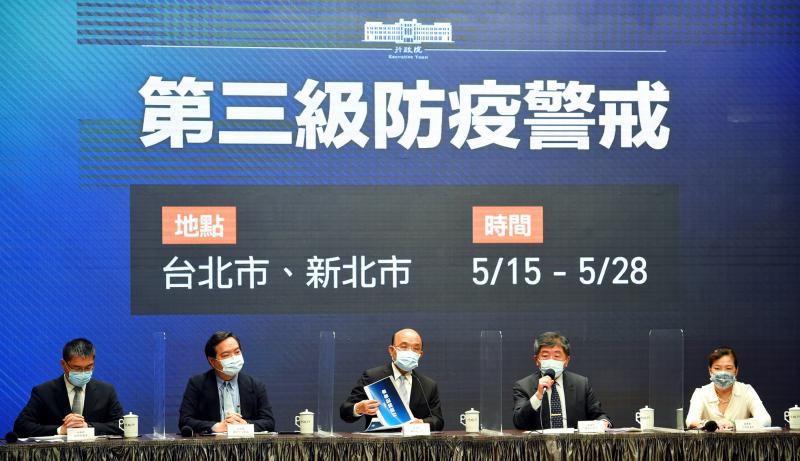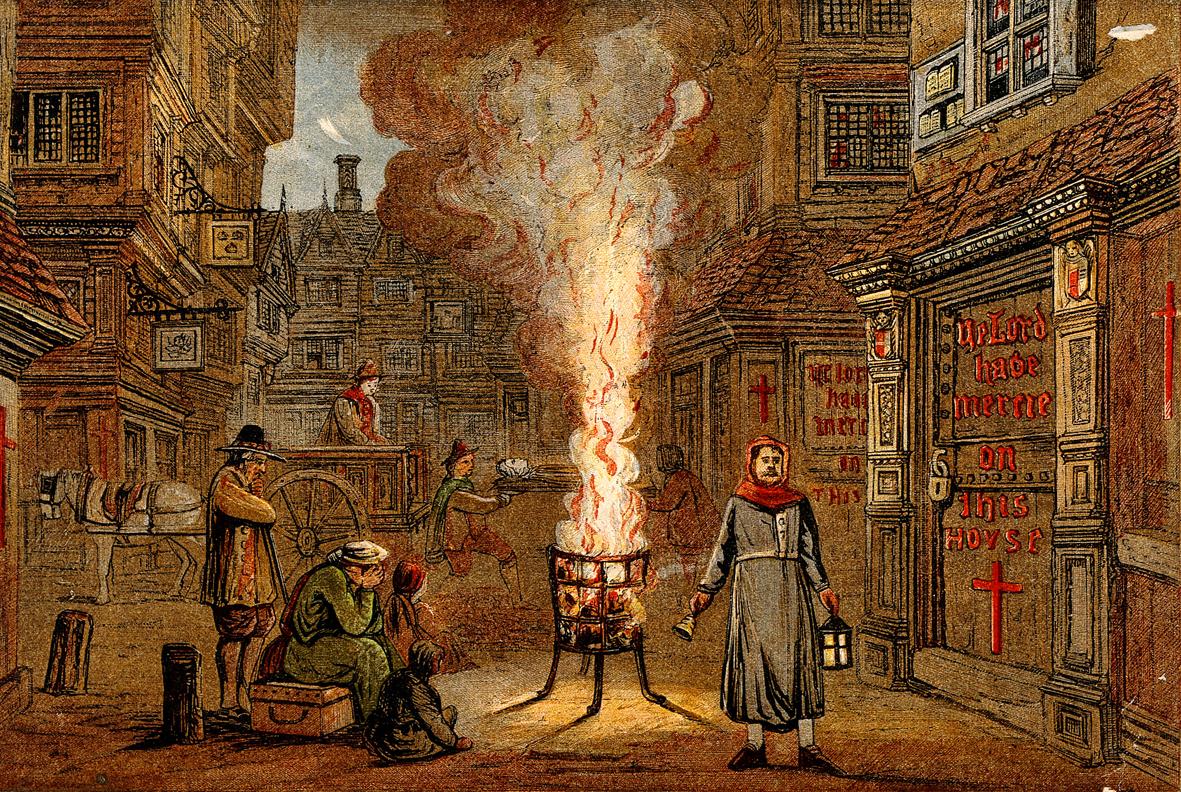And so, every afternoon, we gather round the Internet to hear the latest numbers on the sudden outbreak of COVID-19, a nation united, briefly, and then to speculate, like Greeks before Delphi, on the meaning of the latest oracle.
Samuel Pepys, recording his experience of the plague in England in the summer 1665, still speaks to this moment … “an unpleasing thing to be at Court, everybody being fearful one of another, and all so sad, enquiring after the plague.”
They too followed the numbers with bated breath: “Cripplegate parish alone buried 886, and Clarkenwell 155,” wrote Daniel DeFoe in his lightly fictionalized diary of the plague, describing one random day, though he noted not every death was from the plague. Their streets emptied, like ours: “It was a most surprising thing to see those streets which were usually so thronged now grown desolate,” DeFoe observed. Pepys too: “but now how few people I see, and those looking like people that had taken leave of the world.”

Photo: Liu Hsin-de, Taipei Times
They too dealt with uncertainty, with unprepared governments, with governments that had prepared, but in the wrong way, or just didn’t care. The “it’s a hoax” and objections that anti-plague policies hurt business are also old.
CHOLERA BLUES
During the 1831 cholera outbreak in Sunderland, England, the government enforced a quarantine on ships arriving at the local port, hitting trade. Local businessmen and elites formed an “anti-cholera” party to attack the talk of cholera. It successfully pressured doctors into withdrawing their diagnoses of that plague.

Photo courtesy of Wikimedia Commons
During the cholera outbreaks in 19th century England, immense, long-term pressure from many people was necessary to get the government to move off its murderous laissez-faire attitude that if poor people wanted sewers and clean water, they’d pay for them on their own. The 1831 to 1832 outbreak killed over 30,000, yet little was done. In 1848 a similar outbreak claimed 62,000.
In 1896, when cholera broke out in India, at first the Raj shrugged. It was a disease of the poor, weak and non-white, after all. Understanding thus that the authorities respond to problems by punishing the powerless, many of us worry about what will happen to the migrant workers here, both legal and illegal, because of COVID-19. Any excuse for a crackdown, right?
On the one hand, the authorities promised that illegal workers could come in for testing without being punished. That humanity exists side by side with business as usual: a Filipino friend reports that they made the day shift and night shift workers in her dorm move so each shift lives in separate parts of the building, blaming the virus — even though the common areas, bathrooms and romantic relationships are shared by workers of both shifts. “Moving from first to the fourth floor, on my day off, in a building with no elevator!” she fumed.

Photo courtesy of Wikimedia Commons
Suffering from the COVID sads? “No one can comprehend my sensation on hearing laughter in our camp this morning,” wrote the Marquis of Hastings in his 1817 diary of his trip across India during a cholera epidemic, after witnessing the suffering of his troops from the disease. “So home and late at my chamber, setting some papers in order; the plague growing very raging, and my apprehensions of it great,” Pepys wrote.
I did not realize how much I was sustained by fantasies of foreign vacations, until travel was taken from me by the virus.
OH, THE RUMORS
One common response to restoring the feeling of control in a world slowly spinning out of control is rumors, which feel like insider knowledge to their listeners and purveyors.
Pepys recorded many in his diary: “I am told also that the Duke of Buckingham is dead, but I know not of a certainty.” The proliferation of folk remedies and various forms of magical response too have this function, in every plague.
Nietzsche once remarked that “If a man has character, he has also his typical experience, which always recurs.” So with history.
The virus. Drought. Power shortages. The pigeons of our developmentalist construction-industrial state are all coming home to roost at the same time. This observation is not new — Walden Bello and Stephanie Rosenfeld published Dragons in Distress, about the systemic failure of East Asian developmentalist states, back in … 1992.
Much has been made of Taiwan’s “resilience,” but that is largely a positive gloss on the state’s capacity for lurching, reactive responses: in Taiwan, a constant flow of expedients keeps the emergent failure of things in a state of permanent suspension, thus making every great event an opportunity for moralizing about abysses and brinks and suchlike.
Indeed, disease is always viewed through the lens of moral failure. Referring to the deaths of sailors from cholera in Gosport (now the Norfolk Navy Yard), the Secretary of the Navy wrote: “Many of them, I understand, died in Norfolk of the cholera, the victims of their insubordination and intemperance”.
Facing COVID-19 in Taiwan, we are Thomas Vincent thundering in God’s Terrible Voice in the City of the 1665 plague in England that God was speaking to humans through the plague, and what he had to say about us wasn’t very nice. We’ve just updated that tone to talk about public policy.
Easy to be negative. Yes, the government should have clamped down on pilots and ensured they were vaccinated. Yes, there are not enough tests. Yes, there are not even 10 contact tracers for the city of Taipei and its teeming thousands. Yes, the authorities failed. But such failure — I think we all knew — was inevitable, the virus is too potent, too versatile, to be contained by the vigilance of mere mortals. Our long twilight of normality was bound to end sooner or later.
We are not going to beat this by May 28, when the current round of school and other business suspensions is slated to end. But we will beat it. After all, the chief characteristic of Taiwanese is not hard work but doggedness — they keep pounding their heads at whatever wall is put in their way, until it gives. I have every confidence that they will succeed.
Or maybe I am just being Pepys: “The weather hath been frosty these eight or nine days, and so we hope for an abatement of the plague the next weeke, or else God have mercy upon us! For the plague will certainly continue the next year if it do not.”
Notes from Central Taiwan is a column written by long-term resident Michael Turton, who provides incisive commentary informed by three decades of living in and writing about his adoptive country.The views expressed here are his own.

Jacques Poissant’s suffering stopped the day he asked his daughter if it would be “cowardly to ask to be helped to die.” The retired Canadian insurance adviser was 93, and “was wasting away” after a long battle with prostate cancer. “He no longer had any zest for life,” Josee Poissant said. Last year her mother made the same choice at 96 when she realized she would not be getting out of hospital. She died surrounded by her children and their partners listening to the music she loved. “She was at peace. She sang until she went to sleep.” Josee Poissant remembers it as a beautiful

Before the last section of the round-the-island railway was electrified, one old blue train still chugged back and forth between Pingtung County’s Fangliao (枋寮) and Taitung (台東) stations once a day. It was so slow, was so hot (it had no air conditioning) and covered such a short distance, that the low fare still failed to attract many riders. This relic of the past was finally retired when the South Link Line was fully electrified on Dec. 23, 2020. A wave of nostalgia surrounded the termination of the Ordinary Train service, as these train carriages had been in use for decades

Lori Sepich smoked for years and sometimes skipped taking her blood pressure medicine. But she never thought she’d have a heart attack. The possibility “just wasn’t registering with me,” said the 64-year-old from Memphis, Tennessee, who suffered two of them 13 years apart. She’s far from alone. More than 60 million women in the US live with cardiovascular disease, which includes heart disease as well as stroke, heart failure and atrial fibrillation. And despite the myth that heart attacks mostly strike men, women are vulnerable too. Overall in the US, 1 in 5 women dies of cardiovascular disease each year, 37,000 of them

March 2 to March 8 Gunfire rang out along the shore of the frontline island of Lieyu (烈嶼) on a foggy afternoon on March 7, 1987. By the time it was over, about 20 unarmed Vietnamese refugees — men, women, elderly and children — were dead. They were hastily buried, followed by decades of silence. Months later, opposition politicians and journalists tried to uncover what had happened, but conflicting accounts only deepened the confusion. One version suggested that government troops had mistakenly killed their own operatives attempting to return home from Vietnam. The military maintained that the